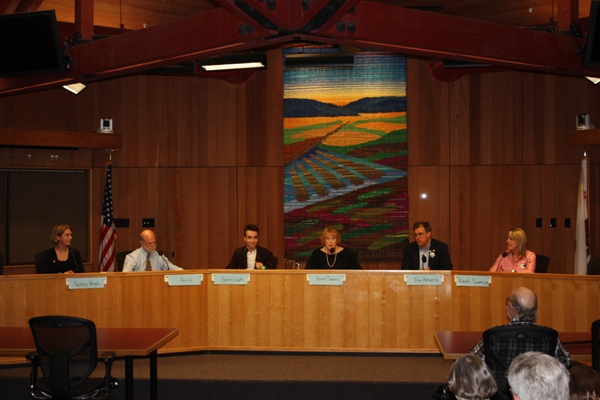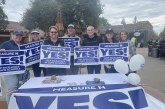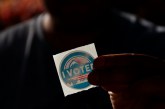
While this debate may have lacked the fireworks of previous debates, it generates its own headline news. Today we will bury the lead and simply report on the answers given. In the future, we will discuss some of the ramifications of today debate more fully.
The first question from the LWV was, “What experience and/ or education will help you work with the city of Davis budgets and possible budget cuts?”
Jon Li cited some experience with budgets and went on to say that there should be a budget report at every council meeting. “We’re now at the point where we’re no longer in a stable economic environment. “ He said he has helped to build several budgets. “The school district, the university, the city and the county are all in trouble. We’re going to all have to work together.”
Daniel Watts said that he has not managed a major business or budget other than when he was on student council in college. He said, “A lot of the problems with the budget can be fixed by common sense.” For example he suggested, “During city council meetings which go on for hours and hours, you have the city attorney sitting there watching what’s happening and presumably getting paid for it. That seems like a ridiculous waste of money.”
He said that when he got the municipal ordinances changed in Davis, he had gone out and done all of the research and cited the case law. However, the council waited until the City Attorney duplicated his work to make the changes.
Also Mr. Watts said, “A big problem with the budget, because it’s a big part of the budget is the amount of money that we pay to the employees.” He continued, “the problem with paying public employees full-time salaries is that you then have pensions that are attached to that so you have this giant unfunded pension liability. A lot of that could be taken care of by replacing full-time employees with part-time employees or contract employees.” He said when the job is done, and the worker leaves, the liability vanishes as you are not paying long-term pensions and benefits.
He went on talk about the Davis firefighters and the fact that they have bought and paid for three members of the Davis City Council. “I say that, because I’m not taking money from anybody. So I owe nothing to them.” The next round of contracts will take hard negotiation and he believes he will be able to do that because he is not going to be beholden to any interest.
Joe Krovoza cited his work as director of development at UC Davis that deals with two sizable budgets and grant opportunities as his experience. “In terms of the city budget, it really is important in all of these economic times for members of the city council to really understand that we are the fiduciaries of the money of the citizens of our community.” He continued, “I have looked to my friends and look to not have bundled funds come into my campaign. I have looked to have a very broad base of support, I think that’s important to maintain independence.”
He is also looking to partnerships as a way to reduce costs. He cites for example the close proximity of the Davis and UC Davis fire departments. “There’s absolutely no reasons why these can’t be consolidated for savings.” He also mentioned the idea of a Joint Powers Agreement to reduce operating expenditures of maintaining grounds.
Rochelle Swanson talked about being a small business owner and knowing about day-to-day and month-to-month budgeting. She also mentioned her consulting business and her work with the Blue and White Foundation. In her planning business, she talked about letting contracts and having to know the compensation level of all employees. Of the candidates, she has the most direct experience with budgets, she also spoke the least at this time, specifically about city policy.
Sydney Vergis talked about receiving recently her professional planner certification. “But when I was working with municipal finance consulting and working with various special districts, one of my responsibilities was reviewing their financial documents and their operations and looking for opportunities to help them find savings in their operations.” She found that they could find savings through combining or sharing facilities or services. That’s a reason why she supports finding collaborative fiscal solutions.
She talked about bolstering local businesses by examining what’s left of our redevelopment money and working with the DDBA and the Chamber. “Certainly the city budget situation is a multilayered issue, we are facing declines in our sales and property tax revenues, we have employee contracts that are negotiated during different economic times, we are facing newly formed and unfunded liabilities with regards to retiree medical.” She said we currently the council gets quarterly broad-brush budgets and thinks the council would benefit from a multiday really intensive budget workshop looking at department by department.
She continued, “I think we ought to remain diligent on employee compensation issues but I think we also need to review the impact that our recent decisions have made on our budget.”
The second LWV question, “The city of Davis has had some contentious meetings in the past and the meetings often run too late for citizens to participate, what would be your suggestion for helping the council work well together while making the meeting more time efficient?”
Daniel Watts began and said, “This is actually something I have extensive experience on.” He suggested that when he was in student government, the students want to talk over and over again, rehashing previous arguments. He said of this situation, “This sounds an awful lot like our city council. That’s pretty much how its run from what I can tell, its run like an undergraduate student government.”
He said he thinks limiting the overall time of debate to half an hour or an hour is a good start. He suggested equal time, five minutes for, five against, each side getting the same time. If someone gets insulted, he suggested a 30 second rebuttal. “Real simple procedural rules like this to make sure that both sides are heard adequately, but also limit the overall amount of time that the city council spends on one motion.”
He also brought up the inordinate amount of time that was spent on presentations and awards. He cited that when he came to speak before council, council took 45 minutes to honor a local business person and then break for cake and punch. He said while it is great to honor local people, he thinks this is not the appropriate time, taking away from council business in the middle of a meeting.
Joe Krovoza said that we need to start earlier and have the executive session on the back end of the meeting. Need more regulation and ground rules. He also said, “We need to consider when issues are really ripe for decision. I’ve seen more than I can to see, of items that are brought to the council and it seems as though there isn’t a very clear direction in the staff report or a structure to the debate.”
He talked about the school district’s policy of having members of the public fill out cards as a way to gain a better understanding of how many speakers and how long it will take.
Rochelle Swanson has a list of things that would help. She talked about getting staff packets out to city councilmembers in a timely manner, she suggested a full ten days to be read and reviewed. She also suggested time approximations on the agenda that is helpful for long agendas and reminds the council when they are running behind. She said she agrees in limiting the ceremonial activities.
Ms. Swanson said she wants to limit council comments and questions to a certain length of time. She also mentioned limiting staff presentations to a certain length of time. Finally she suggested that members of the public have their comments in writing and submit them for the record as well.
For contentiousness, she said that we not “underestimate the power of a time out.” Finally, she wants the last item at 10:00 pm rather than 11.
Sydney Vergis said, “While I believe that differing opinions are certainly inevitable, divisiveness is not. If elected to council, I would be interested in enacting good governance practices right off the bat.” Her suggestions include an early planning retreat laying out their goals for the year, the action items should be on future agendas, she wants to open the lines of communications with commissions, and she would like to see joint meetings between council and the commission happen at council meetings.
She suggested that the council take the approach of listening to each other’s view points, find common ground, and evaluate technical data. “I think if we can do that, we can move past this rancorousness and move forward in a positive direction. I would like to see us move past the bad press. That’s something I’ve already started with my campaign – we’re running a clean and a green campaign.”
Jon Li proposes both the Viable System Model and Policy Governance. Policy Governance, according to Mr. Li, “has to do with the relationship among the members of the council, the relationship between the council and the staff, and the relationship between the council and the public.” He continued, “At this point the city is confused about how we should be doing those things.”
Mr. Li proposed a more structured formal meeting and going to a workshop format. The meeting ends at 9:30. Does not think public business should take place after that. From 6:30 to 7, the council deals with the administrative details, the consent calendar, schedule meetings. From 7 to 7:30 it is the public’s chance to speak, but he wants to limit it to one minute. For the rest of the meeting the staff brings forward what they want to do, the council gets a half hour to debate and discuss and then a half hour to decide.
That was the last of the league questions and they then took four audience submitted questions.
“What are your plans for an emergency fund in Davis and its use?”
Joe Krovoza, “Right now we have a 15 percent reserve goal in the city and with what’s been going on at the state with the lack of flexibility that we’ve created for ourselves with our budget and going under 15% now, so we do need to preserve that.” He also said that in addition to the need to support Measure Q (sales tax extension), “I think in these tough economic times, looking at whether 15% is enough is very appropriate.” He talked about the need to increase flexibility, “I do think making tough budget decisions is going to help us have some room in our budget to do things that are really exiting for Davis.”
Rochelle Swanson also agrees that the 15% reserves is a catastrophe fund. “Nothing more,” she said, “Not something that should be dipped into unless it truly is for emergency. I think the reserve line needs to be a line item in our budget and currently it would have brackets around it because it would be beneath where it’s at and we need to make sure that that remains at 15 if not higher.” She believes that the state will continue to come after our funds and therefore we might consider going higher. She also said we need to be smarter about our budgets in the future to avoid having to go to the voters for more funding.
Sydney Vergis answered, “So part of closing our budget deficit this year was to actually backfill our 15 percent reserve. Using our reserve for ongoing operations makes me nervous. I do think that is for emergencies only. I really believe in bolstering what we have as a city right now.” She talked about the problems faced with revenue and relying on car taxes and property taxes, the need to diversify our economic base and fill our empty store fronts.
Jon Li said that “city and state revenues are down. The economy is becoming more volatile. I don’t think 15 percent reserve means anything. I think that we are facing tough economic times. I think that past city councils have been too generous.” He said that there are a number of employees that should see pay cuts which he prefers to layoffs. He also does not like furloughs, people should be paid to do their job and the people of Davis should not suffer from the loss of services because of this and therefore we need to renegotiates the city contracts.
Daniel Watts mentioned his brother at a school district who lost his job, he found a district in Sunnyvale that planned ahead and tucked away money during good times. While every other school district is cutting jobs, Sunnyvale is actually hiring. He said, “That’s what we should be doing. This 15 percent reserve should be tucked away, it should be saved for a rainy day. We shouldn’t be using this.”
“Will you be accepting campaign donations and endorsements from public employee groups whose contracts you will be negotiating if elected?” (Please note on this question, this is the complete statement by the candidate in response to this issue).
Rochelle Swanson started out. “I have great respect for city employees who provide services for us. I will not be accepting endorsements or bundling of donations any employee groups. There’s a couple of reasons why. I think one is the perception. While I don’t think that any particular candidate is for sale, or has the anticipation that they’re going to be influenced, perception matters. I think it is important that that perception be one of trust for the candidates that are up there negotiating contracts. On the other is the potential, the potential for the entities to expect to have special considerations down the road. I think that it’s important because we make tough decisions up there that people know that it’s based on what’s fair and what’s best for the city of Davis. Not whether or not someone had contributions. It’s tough, it’s expensive to have a campaign. I’ve actually had to turn down money from a bargaining unit, they completely respected and understood why because they wanted to know that when I was making decisions for them, should I be elected, it would be what’s fair.”
Sydney Vergis said, “Well I currently have the endorsement of the Sacramento Central Labor Council and I have received $100 from them and $100 from a local Operating Engineers group. No bundled contributions. It’s my understanding that the city limits one person or one business can only give $100. And certainly that anyone who might be for sale for $100 should not run for office. I think that in the coming years, we’re going need really good and trusting working relationships with our unions as we’re looking to negotiate employee contracts that fit the current economic climate. I believe that any kind of negotiations should be done for not only what’s fair for the employee but what is sustainable for the city of Davis.”
Jon Li, “Daniel and I are not accepting contributions so it will be interesting to see how we fill this minute. As I’ve just expressed, I’m appalled by what public salaries have become. I think the Public Employee Collective Bargaining act of 1975 was an incredibly bad mistake. Jerry Brown couldn’t wait to sign it. Every year Ronald Reagan vetoed it. So I understand the history and the politics of why it happened. But it lead to continuous escalating salaries and it’s out of control. So I think we’ve got to stop it. I think Vallejo was the future for too many cities.”
Daniel Watts said, “There might be a $100 limit on the amount that every individual can contribute but when you have 45 firefighters that each donates $100 on the exact same day to the exact same candidate, that’s $4500 suddenly. Then when the firefighters union spends an additional $5000 in independent expenditures, that now adds up to $9500. So suddenly $100 from one individual has become $9500 and that is a significant amount of money in a city this size. That’s enough to pay for fliers and then if the firefighters go out and they knock door to door, how much is that worth to a candidate who’s running for city council? Public employees unions, even the appearance of a conflict of interest is a problem because it reduces the amount of trust that you the Davis citizen have in your city government. I’m not accepting any money from firefighters; most of whom don’t even live in Davis. And when they buy and pay for 3 out of the 5 members of the Davis City Council, and they’re not even Davis residents themselves that’s a big problem.”
Joe Krovoza: “I’m not accepting any bundled funds. I’m not soliciting bundled funds. The intent of the voters in Davis is to have a $100 limit from people from a broad part of the community who decide that they like the candidate and they want to give to the candidate. I think the test is to look at whose doing business directly with the city council. So if I’m sitting on the dais I don’t want to have people coming in front of the council who are doing direct private business with the city council. I certainly don’t want a group coming that has bundled their contributions to council. I have designed our finances for my campaign to some extent taking advantage of the fact that I’m a fundraiser, to very broadly seek support. We have 250 or so individual donors to the campaign and I’m very very proud of that. That’s how it’s going to be. When I was in law school I wrote papers on election law, I became acutely aware of soft money in politics and if I’m going to run, I’m going to serve, I want to do so with a great amount of independence. That’s where I am on this issue.
The next question was, “Davis will lose $3 million due the judicial decision on local redevelopment funds what was the basic decision and what would you do to make up this loss?”
Sydney Vergis said “Well the state swooping in and taking three million dollars from our redevelopment money is quite serious. Redevelopment money is meant to be spent to keep local businesses in business, to help preserve local jobs, to help to provide for affordable housing options.” She pointed out our pass through agreement, the money we give the county not to develop on Davis’ borders, comes from the redevelopment fund as well. She cited Paul Navazio as suggesting that this might end redevelopment as we know it. She called this a serious issue and recent issue, “For that reason I’m really focusing on trying to figure out what remains of our redevelopment agency, but how can we help now through policy, through land use policy, really help support our downtown businesses and neighborhood shopping centers. “
Jon Li said that the redevelopment is an idea that is about to disappear. He suggested we need to do a complete reassessment about what the government should be doing locally in the city. “We lost a department on Tuesday night. We’re changing radically as a city and that just happened at the announcement of the city manager. I’m sure the discussion has happened somewhere. But I don’t think it’s happening in a way that most people that care about how the city works understand that we’re a completely different place than we were a week ago.” He concluded, “there are blocks of money that we’ve been counting on that are going to disappear.”
Daniel Watts said he thinks it’s difficult to figure out how to get the money back. He suggested that this is due to the fact that the state is in trouble financially. He suggested in response we need to remove restrictions on businesses relocating and restriction on how they can redevelop their own business.
Joe Krovoza said this is not a new issue, as the state has repeatedly attempted to get redevelopment funds. He thinks the Superior Court decision may not stand since he does not see the reasoning why it would be okay this time, but not before. “It’s not a done deal yet.” His solution is partnerships, Measure Q, and a hard look at our budget.
Rochelle Swanson said that the California Redevelopment Agency is trying to do a stay on the decision while they appeal the case. The other good news she said, is the ballot proposition in November would protect local funds. Locally she said, “I think it’s important that projects that we have in the works, now that we’re looking at using redevelopment money, even if that does get stayed and we end up going through waiting for an appeal, we need to be cautious that we’re not spending that money even if it’s sitting in the coffers.”
The last question was on Measure R and the renewal of Measure J, I will save that for tomorrow since it ties in with the ballot measure debate.
—David M. Greenwald reporting






IMHO, Daniel Watt did very well in this debate. He wasn’t afraid to speak his mind, and used a common sense approach by giving specifics, something we need in this city. Very quick on his feet in a debate. He has shown a proven track record of effecting change in city policies, by getting the city to start the process of repealing its own unconstitutional laws. Thus Daniel already has a certain grasp of how to get things done, a surprising turn of events. He’s a little rough around the edges, but he reminds me a bit of Lamar Heystek – young, idealistic, a representative for youth in this town (which is sorely needed) and ready to try to do the right thing for Davisites, without being beholden to special interests. Good job, Daniel…